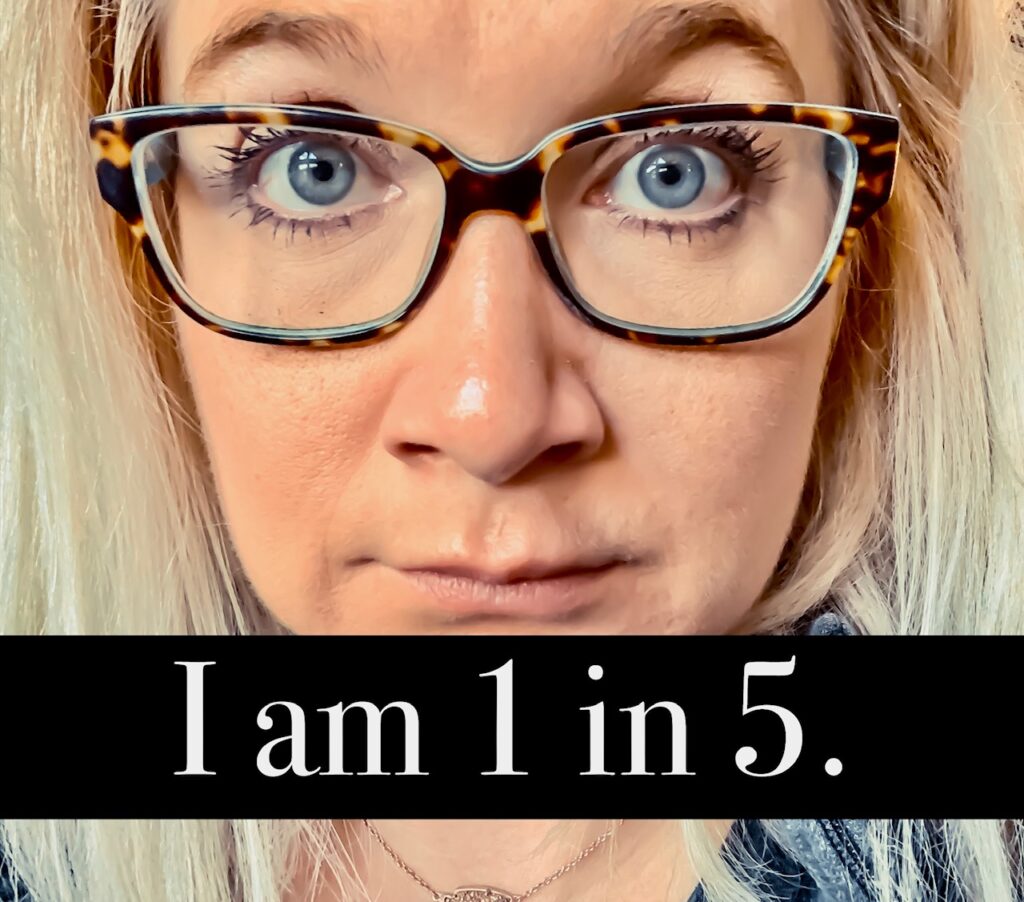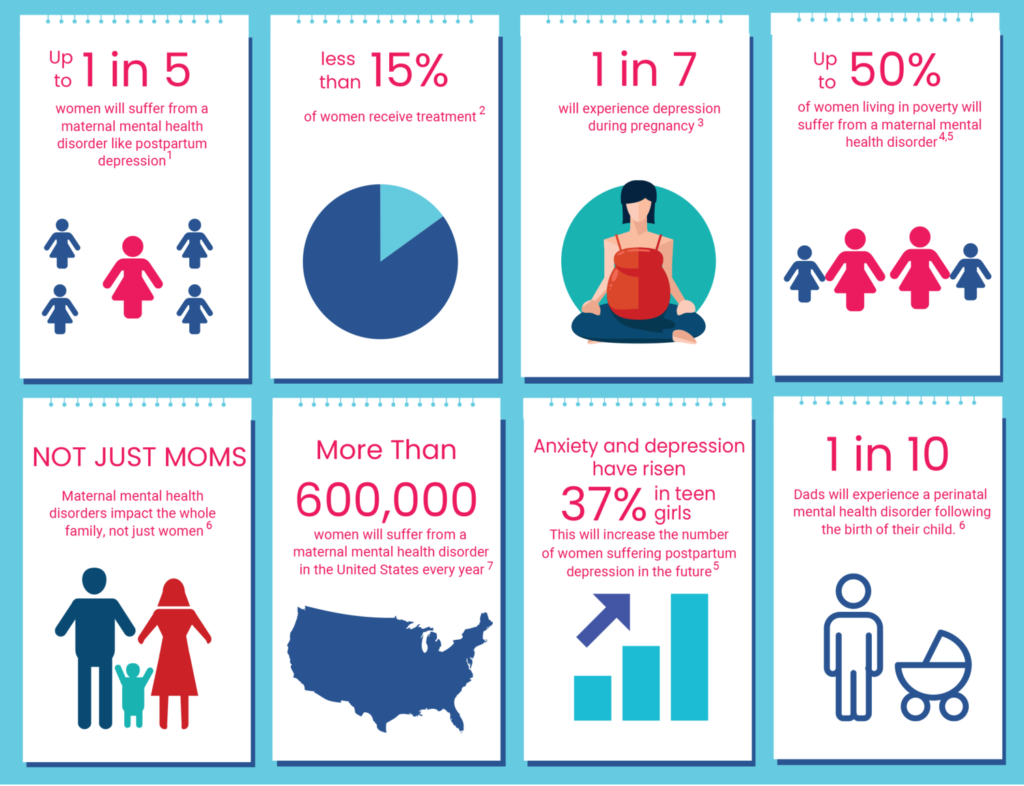
I am 1 in 5.
Ladies, postpartum depression or anxiety is not something to be taken lightly. If you’ve read, “Mommy’s Got a Tramp Stamp,” you already know that I was clueless about PPD until I experienced it.
Awareness needs to be at the forefront. Postpartum depression needs to get out of the shadows. And, dare I say, become normal!!
Up to 1 in 5 mamas will experience postpartum depression or anxiety after giving birth.1 My name is Cassie Pigg, and I am 1 in 5. If it’s not something you have personally experienced, you probably know someone that has gone through this shit storm of emotion. It’s no freaking picnic.
More than 600,000 women in the US will experience PPD per year.7 Ladies, that’s a substantial number. If we don’t seek help, the consequences can be drastic. Untreated postpartum depression or anxiety can affect everything from our immune systems to our heart health. Chronic stress and anxiety can seriously shorten our lifespan. I don’t know about you, but I’ve got shit to do. Can’t be having none of that.

We need to ask for and receive help!
Less than 15% of women receive treatment for postpartum depression.2 LESS THAN 15%! This statistic is way too low. In my experience, I honestly don’t know if I would have survived had I not received treatment immediately. I was on the brink of psychosis. It is a terrifying situation. If you experience symptoms or suspect another mom is experiencing PPD, get help, or encourage her to seek it. Women must get the treatment they need. Suicide is the 2nd leading cause of mortality postpartum, and that is unacceptable. It makes my heart hurt.
PPD isn’t just limited to the postpartum period. 1 in 7 mothers will experience signs of depression during pregnancy.3 Talk to your doctor. There are medications and treatment regimens that are safe during pregnancy. Thankfully, this is not something that you need to tough out. You can get help so that you can forge on creating your tiny human.
Up to half of the women living in poverty will suffer from postpartum depression.4,5 Even if this doesn’t apply to you, it doesn’t mean your exempt. Anyone (I mean absolutely anyone) can experience PPD. It is not caused by something a mother does or does not do. PPD is not your fault; it is a combination of emotional, physical, and environmental factors. Seriously, you’re experiencing a surge of hormones during a dramatic life-changing event. It’s a recipe for disaster.

Mom’s aren’t the only ones struggling.
PPD affects the entire family.6 During my psychotic break, it was terrifying for my husband. He still won’t even talk about it very much. It can also have effects on your baby’s development if left untreated. Mamas, your family needs the best version of you!!
As I mentioned before, postpartum depression doesn’t discriminate, and dads are not exempt. 1 in 10 new dads can experience mental health conditions after the birth of a baby.6 We can’t count them out of the equation.

According to experts, PPD will continue to rise. There are risk factors that make some women more prone to experiencing PPD, including previous mental health conditions. With anxiety and depression escalating among teen girls,5 there is likely to be an increase when these women start having babies. Even more reason to start speaking out now!
Listen, these facts are terrifying, but I have no intention of scaring anyone. They are here to raise awareness about this condition that seems to be swept under the rug more often than not.

Talk about it!
There is no shame in voicing your emotions postpartum. Motherhood is freaking rough, y’all. As a society, we need to lift up maternal mental health and give mamas the support they deserve. Instead, we seem to shove it to the back of the closet in hopes that no one will find out.
The skeletons in our closet are not shameful; they are beautiful. Mine are out dancing in the street, and you know what? It makes me a better and stronger mama.
Cheers, girlfriend. We’re all just hanging on by a thread.
To learn more about my struggles with postpartum anxiety, check out “Mommy’s Got a Tramp Stamp.” It is available on Amazon, Barnes & Noble, and it can be requested at any bookstore! Use Promo Code BLOG20 to save 20% from the Mom Stuff Store!!

1. CDC Depression among Women, https://www.cdc.gov/reproductivehealth/depression/index.htm. Accessed April 25, 2019.
2. Byatt N, et al. Enhancing participation in depression care in outpatient perinatal care settings: a systematic review. Obstet Gynecol. 2015;126(5):1048-1058.
3. Black R. Depression During Pregnancy: Millennials Suffer More than Previous Generation, https://www.psycom.net/depression-pregnancy. Accessed April 19, 2019.
4. Dolbier CL, et al. Relationships of race and socioeconomic status to postpartum depressive symptoms in rural African American and non-Hispanic white women. Matern Child Health J. 2013;17(7):1277-87.
5. Chung EK, et al. Maternal depressive symptoms and infant health practices among low-income women. Pediatrics. 2004;113(6):e523-e9.
6. Kim P, Swain JE. Sad dads: paternal postpartum depression. Psychiatry. 2007;4(2):35-47.
7. O’Hara MW, Engeldinger J. Treatment of postpartum depression: recommendations for the clinician. Clinical Obstetrics and gynecology. 2018 Sep 1;61(3):604-14.
8. Mojtabai R, et al. National trends in the prevalence and treatment of depression in adolescents and young adults. Pediatrics. 2016 Dec;138(6).